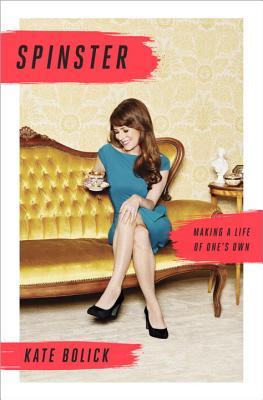I'm turning thirty-two in less than a week. I am single, I live with my dog, and I work full-time. When I was growing up, I didn't envision being unmarried at thirty-two. I figured I'd be married and have children, and I'd probably stay home with them (a different full-time job). I've reached a level of okay-ness with where I am-- I'm not actively scrambling to find a husband. I honestly don't feel the tick of my biological clock. But does this make me a SPINSTER?
Kate Bolick's Spinster: Making a Life of One's Own tackles the idea of spinsterhood through her personal reflections on a handful of literary women. She explores the history of spinsters, what it means to be one, and her own feelings toward her life. In short, I loved it. I identified with it. And hell yeah, I'm a spinster.
I'm not the only one-- over 100 million American women are unmarried. Bolick cites definitions of the term spinster, most of which refer to being older than the usual age for marriage, whatever that is. I've read that Americans are getting married at older ages now, so what is the "usual" age now? In the grand scheme of things, does it matter? And why should there be a negative term for women who are unmarried-- "spinster"-- when unmarried men are considered "bachelors," a positive term for a man who cannot be "tamed?"
The extraordinary women Bolick writes about: Neith Boyce, Maeve Brennan, Charlotte Perkins Gilman, Edna St. Vincent Millay, and Edith Wharton, all were unconventional for their time periods and tried to carve out their own identities. In so doing, they inspired Bolick to live authentically, although not without a few bumps along the way.
It was refreshing to find myself in these pages and know that I'm in good company. Bolick states, "What bothered me was the assumption that because I was a woman in her early thirties, I must be 'desperate' for marriage." You know what I'm desperate for? Being near my friends and family, spending time doing what I love (art and reading), and working at a good job that I like (librarian). I have all those things. If I met someone, that would be awesome, but right now, I like being responsible only to myself and my pup. I am desperate not to worry what other people think of me, which is a work in progress, but it was helped by this book.
I'll end with a quote from Neith Boyce that Bolick includes on page 82:
"I never shall be an old maid, because I have elected to be a Girl Bachelor. And as to regretting this choice, you know the saying of the philosopher, 'Whether you marry or not, you will regret it.'"
My take away from this book is to be true to yourself, and don't feel weird about the path you've chosen. It's your path, after all.
Ex libris,
Marissa
